How to deal with weeds in the country: control measures and methods of destruction
There is absolutely no doubt about the fact that wild weeds are much more hardy than cultivated ones. Therefore, all gardeners and gardeners are well aware that if weeds are not destroyed in a timely manner, they will gradually begin to take the area from cultural plantings and your garden will be completely covered (overgrown) with them. That is why, like it or not, you don’t have to save energy in the fight against this evil, and only purposeful and regular work to destroy weeds can give a positive result.
You can read about what remedies help stop the invasion of weeds below.
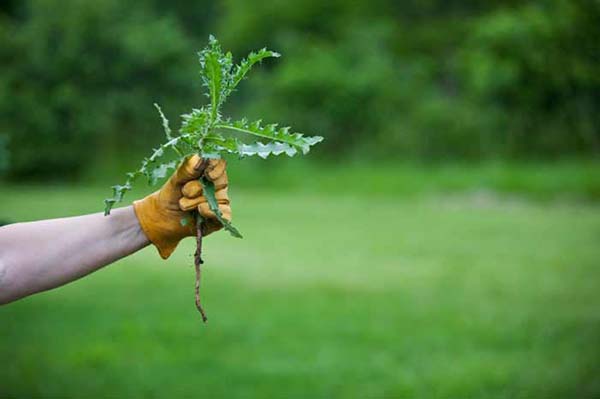
Content
What are weeds and what weeds relate to it
Weeds (or weeds) generally refer to plants that have grown where other crops were originally planned. As a rule, the appearance of such weeds reduces the yield, or, if it is a flower garden, worsens its decorative properties.
Weeds can be divided into annuals and perennials:
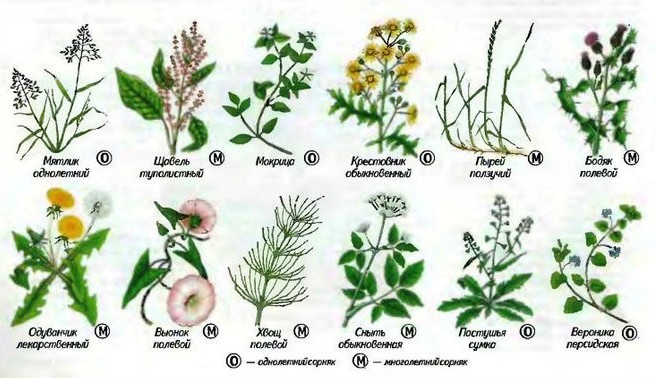
Weeds, many of which are by no means so bad, and even medicinal, enough.
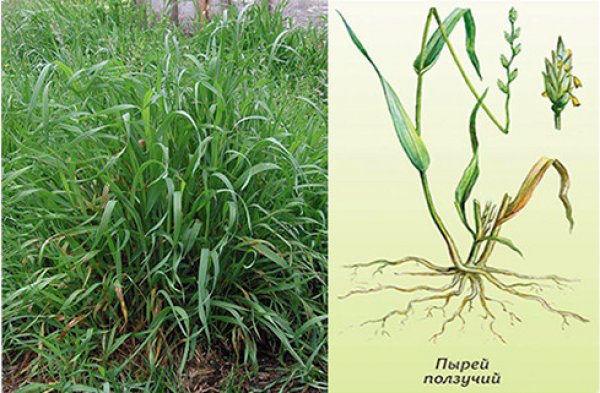
But the most "annoying" weeds in our gardens are creeping wheatgrass which is also called "dog grass", (although the roots of this plant are very useful and have an enveloping, diuretic, hemostatic, expectorant and diaphoretic effect), and Sosnovsky hogweed, which can simply grow to an unimaginable size and in contact with which, you can get a pretty severe burn, even through clothing.
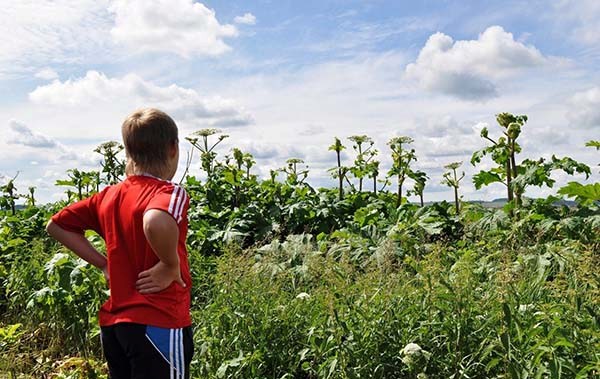
Video: how to defeat a hogweed
Ways to control weeds in the garden
There are a fairly large number of control methods and means for the destruction of weeds at their summer cottage. Many of them have long established themselves from the best side and can rightfully be called folk.
Timely weeding
The oldest, most popular and laborious way of dealing with weeds is weeding the beds.
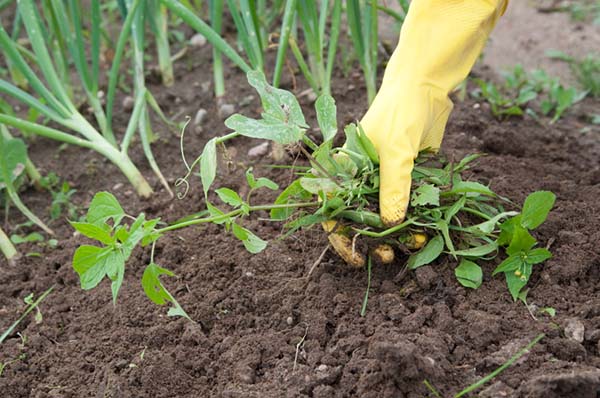
Weeds need to be destroyed in a timely manner, not allowing them to bloom, and the seeds to ripen. The bottom line is that fewer seeds, less weeds.
Digging in a plot with a pitchfork
The best gardening tool for controlling weeds in your garden is a pitchfork. You need to dig up the site with a pitchfork, not a shovel, because when you use a shovel, you simply cut the roots of weeds, and then they sprout again and multiply even more. You just need to dig up the ground with a pitchfork (so it will be looser), pull out all the weeds along with the roots, and then destroy.
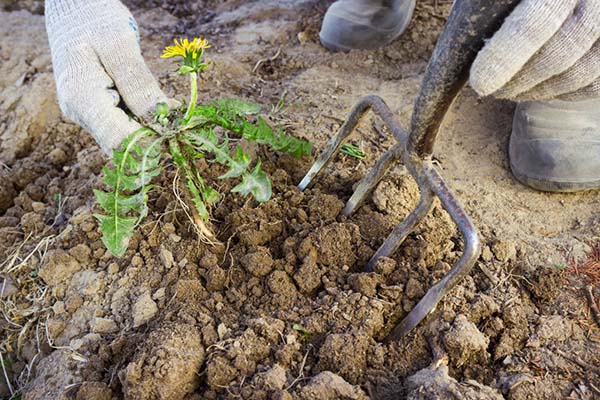
Comment! The method is quite laborious, but effective.
Cutting the ground part of weeds
Just take your scissors and cut the weed at ground level, as no plant can survive long without a ground part. If you use a hoe or hoe, then during weeding you simply cut the roots, and the roots remaining in the ground will again sprout in even more quantities.
Comment! This method is hardly suitable for weed control in large gardens, but for small gardens, as well as in caring for rockeries - that's it!
Compost heap
A huge number of weed seeds are introduced into the soil along with compost, humus and manure. To avoid this, it is imperative to make compost heaps in your summer cottage. They need to withstand all these fertilizers for 2-3 years, so that everything is quail and the seeds lose their germination.
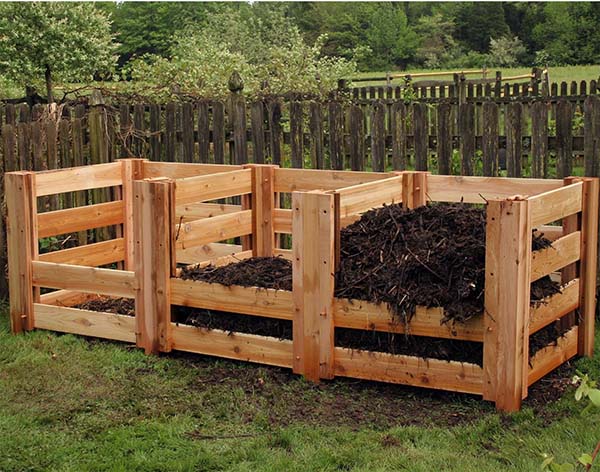
Mustard
One of the most effective ways to combat weeds, or rather to displace them, is sowing a garden in early spring with white mustard, you can also use rye and others siderates... Next year there will be much less weeds in this area. Moreover, white mustard is an excellent nitrogen and phosphorus fertilizer for the garden.
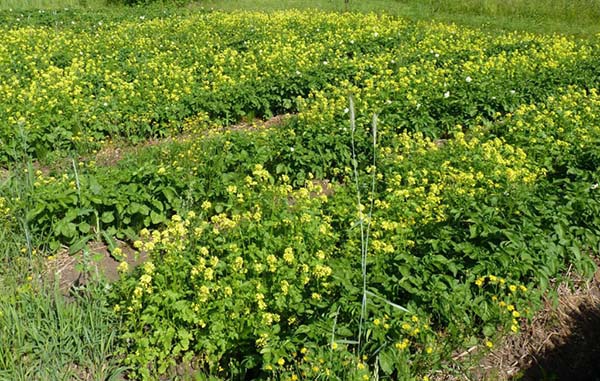
Video: mustard for weeds, phytophthora, scab and for fertilizing the garden
Mulching
As mulch against weeds, you can use expanded clay, bark, wood chips. For mulching to effectively rid your plants of weeds, the thickness of the mulch layer should be at least 5 centimeters, and even better if you put a 10 centimeter layer. In addition, it will look very aesthetically pleasing, the mulch will only emphasize the beauty of the plants.
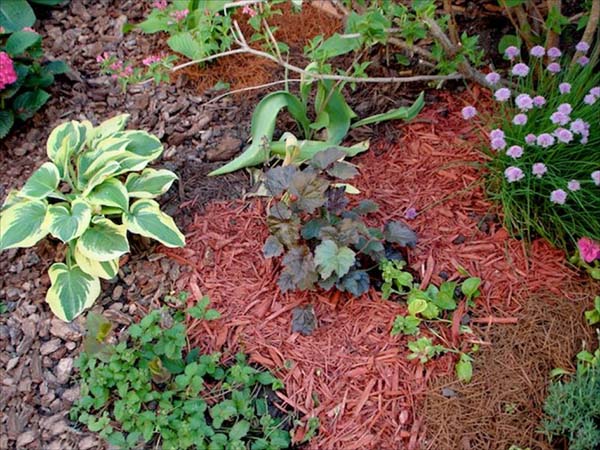
Comment! The method is ideal for combating weeds in flower beds and flower beds, as well as in the near-trunk circles of trees and shrubs (for example, mulch strawberries). In addition, using this tool, you can rid garden beds of weeds (for example,grow potatoes under straw or hay).
Video: mulching against weeds
Covering material and black film
Again, if you are not in a hurry, then 1-2 years before sowing cultivated plants, cover the required area with a dark, dense and light-proof material, for example, it can be burlap, plywood sheets, old linoleum, hardboard, geotextiles. You can also use special black agrofibre or film. Covering material is, perhaps, one of the most effective ways to combat weeds in large summer cottages, they will definitely not say thanks for it.
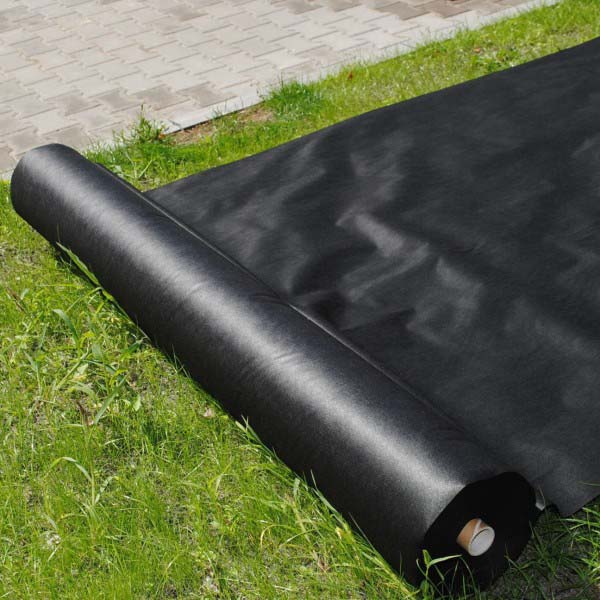
By the way! Under the black film you can grow strawberries.
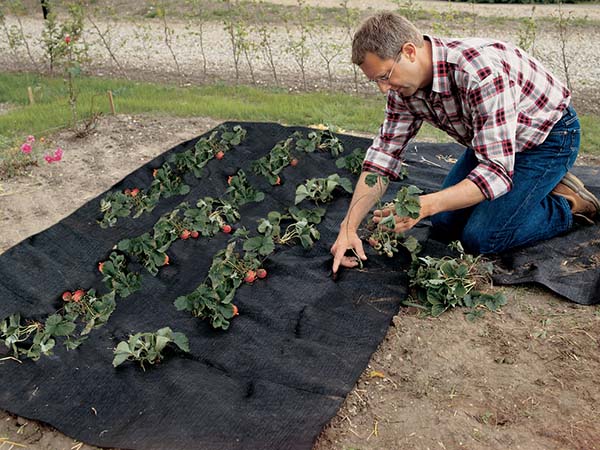
Video: how to fight weeds in the garden using geotextiles, black spunbond and decorative mulch
Important!Keep in mind that using geotextiles and decorative mulch is expensive and the effect will not last forever. So, for example, geotextiles, as a rule, last for 3-4 years. The problem with decorative mulch (from bark and stone) is that in a couple of years, during windy and rainy weather, it will simply be covered with earth, leaves and other organic matter from above, and weeds begin to grow right on it.
Folk remedies: vinegar, kerosene
Vinegar
Another popular, and most importantly, non-toxic weed killer can be a solution of vinegar, salt and detergent. You should take 100 grams of 9% vinegar, 1 tbsp. spoon of salt and mix well, and then add literally 1-2 drops of dishwashing liquid. Then pour the resulting solution into a sprayer or sprayer and spray on weeds in hot weather.
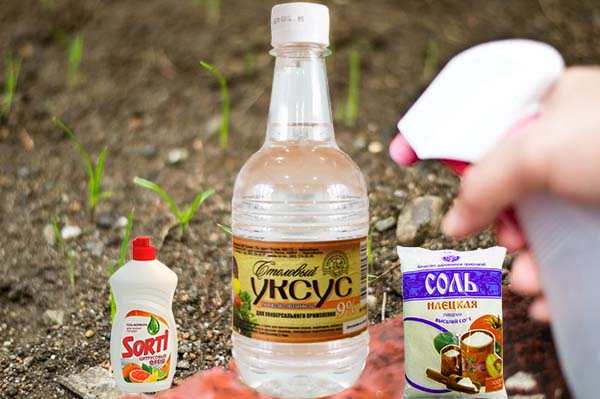
Video: how to prepare a solution with vinegar to combat weeds
Important! According to numerous reviews of gardeners, this method is quite ineffective, but it's still worth trying.
Kerosene
Kerosene (neat, not diluted) is excellent for weed control in carrot beds.
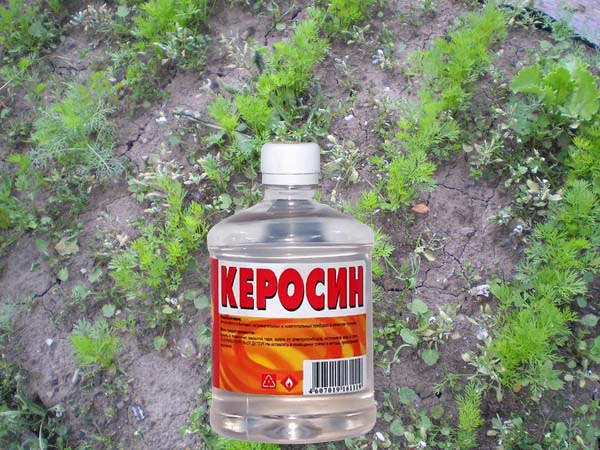
Important! Carrots do not smell of kerosene, they grow clean. But the method is only suitable for carrots, because if it gets on another crop, for example, onions, it will die. Also mandatory condition - no rain and wind!
Spraying with kerosene is also excellent carrot fly remedy.
Saw: weeding carrots with kerosene from weeds and pests
Note! On our website you can find materials about planting and growing carrots in the open field, her thinning, watering, protection against carrot flies and find out why she grows up gnarled, horny and hairy.
The most exotic remedies
Some rather controversial and bizarre weed control products include:
- burning out the site blowtorch;
- gardening vodka before sowing (150 grams per bucket of water);
Video: how to destroy weeds at their summer cottage
Weed control with herbicides (chemicals)
Herbicides are special chemicals that will help protect the garden and summer cottage from weeds.
If you do not want to bother too much and use folk remedies against weeds, then herbicides are your choice.
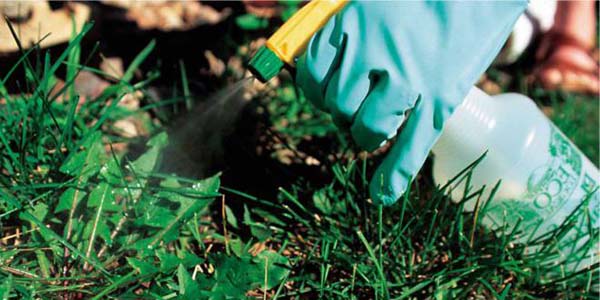
Note! Again, herbicides are chemistry, which means that the treatment against weeds must be carried out in full chemical protection, that is, wear a special mask or gas mask, rubber gloves. Also, you cannot stay on the treated area for at least a week after spraying.
When buying herbicides, it is very important to understand what kind of crop we will be treating, what is the purpose of spraying, since there are very different drugs against weeds.
For example, there is such a drug “Lapis lazuli", which destroys everything except nightshade, that is, tomatoes, peppers, potatoes will remain. As a rule, it is used to control annual dicotyledonous and cereal weeds.
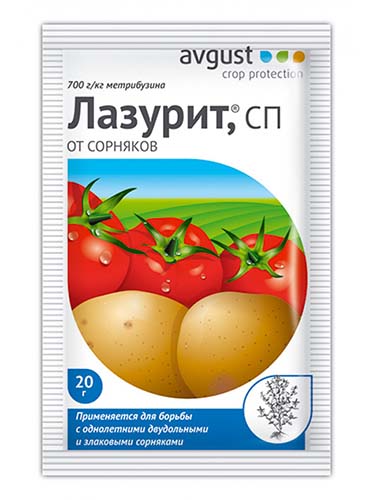
There are drugs like "Gazontrel ", «Bis-300 ″... They are used to protect strawberries, strawberries and lawn from almost all weeds.
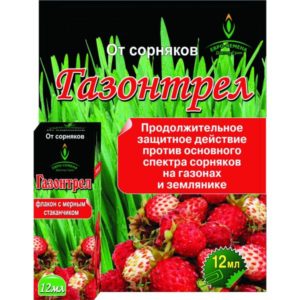
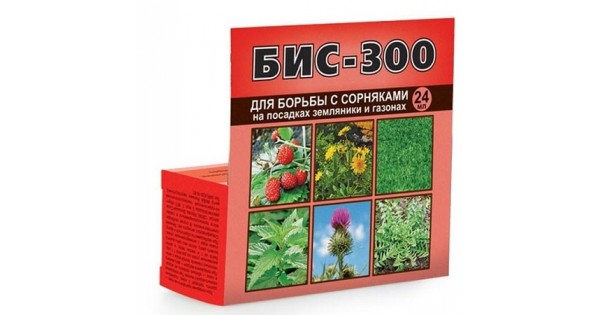
Also from weeds (the same dandelions) on lawns the drug "Lintur" helps.
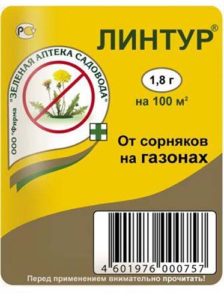
If you need to remove all the weeds around a curb or fence, then you can use the most classic herbicides available at any garden store.
Some of the most popular weed killers (herbicides) include:
- "Tornado";
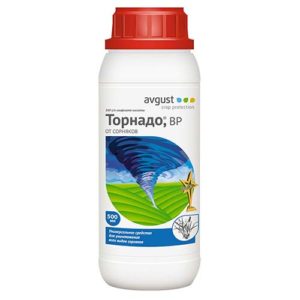
- Roundup;
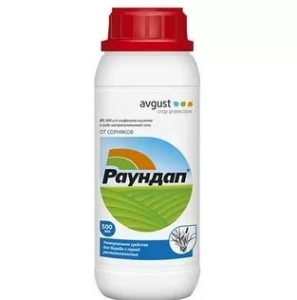
- "Ground";
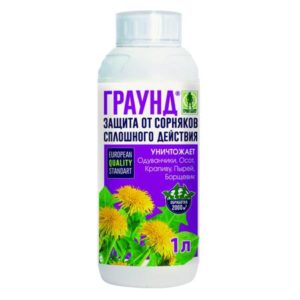
- "Hurricane";
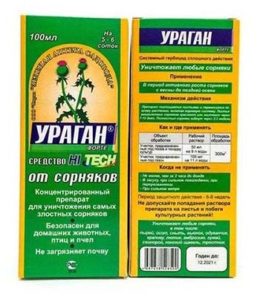
- Agrokiller.
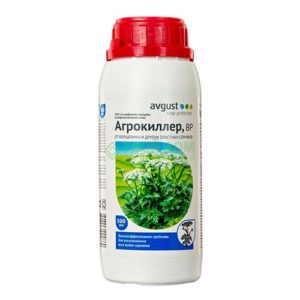
Video: weed control with herbicides - varieties of drugs
As a rule, all these drugs have the same main active chemical - acid glyphosate, but in different quantities: some are more concentrated and stronger, while others are slightly weaker. So, for example, if you have a lot of wheatgrass or cow parsnip (the most persistent weeds) in your summer cottage, then it is better to take the stronger Agrokiller or Hurricane. Moreover, for example, if you take 100 grams of "Hurricane" for 1 bucket of water, then it is advisable to add another 100-150 grams of ammonium nitrate to the solution. The addition of nitrate is explained by the fact that ammonia nitrogen accelerates the passage of the drug into the root system of plants.
Remember! No less dangerous when using herbicides is the fact that your cultivated plants can also be affected, therefore, such preparations against weeds should be used carefully and only in those parts of the garden where cultivated plants do not grow, or use specialized preparations such as Lazurit, Gazontrel , Bis-300, Lintur.
Video: how to apply herbicides against weeds
Unfortunately, gardeners and gardeners have to deal with weeds every year and more than once. Therefore, in order to facilitate their work and prevent the weeds from flourishing on the site, it is very important to "fixate" on the regular destruction of weeds, because, as you know, the sources of weeds are abandoned areas.

